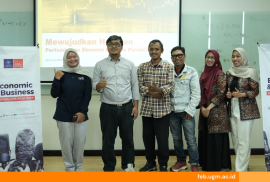Corruption is a significant challenge for most countries worldwide, including Indonesia. Corrupt practices cause financial losses to the state and hinder the nation’s economic growth. Various efforts are being made to combat corruption, one of which is through the use of forensic accounting.
To provide students with a deep understanding and knowledge, the Master of Accounting Program at FEB UGM organized a public lecture titled “Forensic Auditors: Uncovering Corruption Cases in Indonesia.” This event, held on Friday (31/5) in the Drs. Soekamto Auditorium, M.Sc., at the UGM Master of Accounting Building, aimed to enhance the knowledge of Master of Accounting students on corruption so that they can actively participate in efforts to prevent and eradicate corruption in Indonesia. The public lecture featured two speakers: Dian Kartika Rahajeng, S.E., M.Sc., Ph.D., a lecturer from the Accounting Department at FEB UGM, and Abvianto Syaifulloh, S.H., M.H., an Investigative Prosecutor at the Attorney General’s Office of the Republic of Indonesia.
During the event, Dian Kartika Rahajeng, commonly known as Ajeng, explained the role of forensic audits in combating corruption. A forensic audit is a specialized audit that investigates cases with indications of fraud.
“This forensic audit dissects cases to gather evidence to determine whether the case involves fraud or is simply an error. The goal is to find evidence of intentional fraud,” Ajeng explained.
Ajeng elaborated that fraud encompasses all forms of misrepresentation conducted by individuals or groups to cause harm and result in material and non-material losses. There are three categories of fraud: financial statement manipulation, asset misuse, and corruption.
“There are techniques to detect fraud by conducting audits to determine the intentionality of fraud, ranging from data checks, financial and non-financial document reviews, to interviews,” she said.
Ajeng emphasized that preventing and eradicating corruption takes work. Therefore, she stressed the importance of collaboration and multi-stakeholder involvement in the efforts to prevent and combat corruption in Indonesia.
“Fraud is difficult to detect due to high-level collusion without a whistleblower. Therefore, if you see violations, do not normalize them because normalizing legal and ethical violations helps preserve corruptors,” she said.
Meanwhile, Abvianto Syaifulloh highlighted the impacts of corruption. He explained that corruption negatively affects various sectors of the nation’s life.
“Corruption is an extraordinary crime,” he said.
He explained that corruption falls under the category of extraordinary crimes because it harms state finances and impacts all development programs.
“The impact of corruption creates a domino effect, but the most significant impact is on the country’s economy,” he stated.
Abvianto mentioned that one of the economic impacts of corruption is the decline in economic growth. Another impact of corruption in this sector is the reduction in state revenue from taxes, resulting in a decline in the quality of goods and services for the public.
Reportage: Kurnia Ekaptiningrum
Sustainable Development Goals (SDGs)







